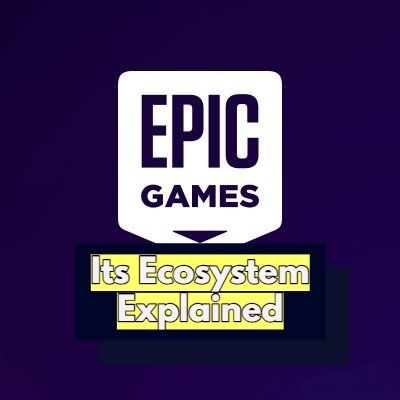
Epic Games – Its Ecosystem Explained: Discover This Key Player for the Metaverse, Web3, and GameFi. Here’s an Overview of Its Incredible Ecosystem and Its Impact Across Several Web3 Sectors.
Epic Games – its ecosystem explained. In this article, we will explore the significance of Epic Games for Web3, the metaverse, and the future of GameFi.
This project plays a pioneering role in the development of the metaverse and its impact on GameFi, where it could redefine how we perceive the video game economy.
Epic Games – Its Ecosystem Explained
Since its creation in 1991, Epic Games has played a major role in the video game industry, becoming one of the most influential studios. Its Unreal Engine and flagship title Fortnite are emblematic examples of how the company has innovated and pushed the boundaries of interactive entertainment. However, beyond these achievements, Epic Games is now tackling much larger concepts: the metaverse, Web3, and GameFi.
-
The Metaverse: Epic Games’ Digital Ecosystem
The metaverse is a buzzword for a shared, immersive digital space, often regarded as the next phase of the internet. It combines elements of virtual reality (VR), augmented reality (AR), and online worlds where users can interact, socialize, create, and trade digital assets in a persistent virtual environment.
Epic Games is at the heart of this transformation through its technology and infrastructure. The Unreal Engine, used to create immersive gaming experiences, is also a key tool for building interconnected virtual worlds. With its high-quality graphics and real-time simulation capabilities, Unreal Engine is one of the most used platforms for developing 3D environments for the metaverse. Whether it’s for VR experiences, virtual concerts, or interactive events like those regularly hosted in Fortnite, Epic shows that its vision for the metaverse is closer to reality than ever.
Fortnite, on its own, has become a sort of prototype for what a large-scale metaverse could become. The game is no longer just a battle royale; it’s a social platform where users can interact in live events, purchase digital items, and even attend real-time concerts, such as those by Travis Scott or Ariana Grande. These are the early manifestations of a broader metaverse, where gaming and digital culture converge.
-
Web3 Integration: A Fundamental Shift
Web3, often described as the next iteration of the internet, is based on principles of decentralization, digital sovereignty, and interoperability. It largely relies on blockchain technology, which enables systems where users own and control their data and digital assets.
Epic Games has shown its openness to innovation in this area. Unlike platforms such as Steam, which have taken a more conservative stance toward blockchain technologies and NFTs (non-fungible tokens), Epic has welcomed blockchain-based games on its Epic Games Store. This shows a willingness to explore the future of Web3, where decentralized digital ownership and blockchain-secured transactions could become central to the video game economy.
By supporting blockchain games, Epic Games is also helping to create an ecosystem where players can truly own and trade digital assets. This paves the way for greater adoption of NFTs in games, allowing players to transfer their virtual items across different games and platforms. Such interoperability is essential to fully realize the vision of Web3, where the boundaries between digital and physical worlds blur.
-
Impact on GameFi: Merging Gaming and Decentralized Finance
The term « GameFi » (gaming and finance) describes an emerging sector where video games and decentralized finance (DeFi) converge. It involves blockchain-based games that allow players to earn money or digital assets through their participation. This represents a major shift in how games are monetized, moving from the traditional « pay-to-play » model to concepts like « play-to-earn » (P2E).
Epic Games’ impact in this area could be significant. By integrating blockchain features into its games or supporting blockchain-built games, Epic can act as a catalyst for GameFi. The popularity of its games and its vast player community make it an ideal candidate to test and deploy cryptocurrency reward systems, NFT exchanges, and even decentralized economic models where players have a direct influence on game evolution through governance mechanisms.
– Fortnite:
Fortnite is Epic Games’ flagship game, launched in 2017, combining a battle royale mode with interactive online events. It has transformed into a social platform where users can not only play but also attend virtual concerts, participate in live events, and interact in an ever-evolving world. With hundreds of millions of players, Fortnite has become a prototype of the metaverse, connecting entertainment and socialization in an immersive digital space.
Fortnite could, for example, evolve into a model where certain items, skins, or tools are tokenized as NFTs, allowing players to freely trade them on decentralized marketplaces, creating a self-sustaining digital economy. This kind of evolution could transform how players perceive the value of digital items, creating a direct link between their gaming time and the tangible value of the rewards they earn.
– Unreal Engine:
Unreal Engine is the game engine developed by Epic Games, known for its graphic power and flexibility. It allows the creation of immersive and realistic virtual worlds, used not only in video games but also in industries like film, architecture, and automotive. With its advanced tools for real-time simulation and photorealistic rendering, Unreal Engine is essential for building the metaverse and 3D interactive experiences.
-
An Economic and Social Revolution on the Horizon?
We cannot introduce Epic Games without mentioning that its commitment to the metaverse and Web3 also has broader economic and social implications. The metaverse, as envisioned by Epic, could become a digital economy in its own right, where virtual goods, services, and even jobs are as important as in the physical world.
Epic Games could play a key role in creating this new digital economy, where players and creators are rewarded for their creativity and contributions to virtual worlds. The introduction of truly user-owned digital assets could reinvent the relationship between creators and players, allowing the latter to monetize their engagement in unprecedented ways.
Socially, Epic is well-positioned to attract a wide audience to the metaverse, especially given the diversity of its players and its ability to create shared experiences that transcend geographical boundaries. Fortnite, with its hundreds of millions of players worldwide, could serve as a launching pad for this transition to a more digital-focused society.
-
Challenges Ahead
Although Epic Games is well-positioned to play a central role in the evolution of the metaverse, Web3, and GameFi, significant challenges remain. The main obstacle is the mass adoption of blockchain technologies, which are still in their infancy. Integrating blockchain into games, for example, still needs to prove that it can offer clear benefits to players without unnecessarily complicating the gaming experience or raising ethical concerns related to data exploitation.
Moreover, the metaverse raises important questions about privacy, data security, and regulation. If Epic Games truly wants to build an interconnected and decentralized digital ecosystem, it must ensure that these issues are proactively addressed to avoid excessive regulation that could stifle innovation.
Epic Games Introduction – Key Takeaways:
Epic Games is undoubtedly one of the most influential players in the transition to the metaverse and Web3. With its Unreal Engine and the popularity of Fortnite, the company has already laid the groundwork for immersive and interactive virtual worlds. By embracing blockchain technologies and exploring GameFi possibilities, Epic could not only transform the video game industry but also redefine how we interact with the digital economy and virtual worlds.
While the challenges are numerous, the potential to revolutionize how we consume and create content is immense. Epic Games is at the forefront of this transformation, and it will be fascinating to see how the company continues to push the boundaries of what is possible in the digital world of tomorrow.
